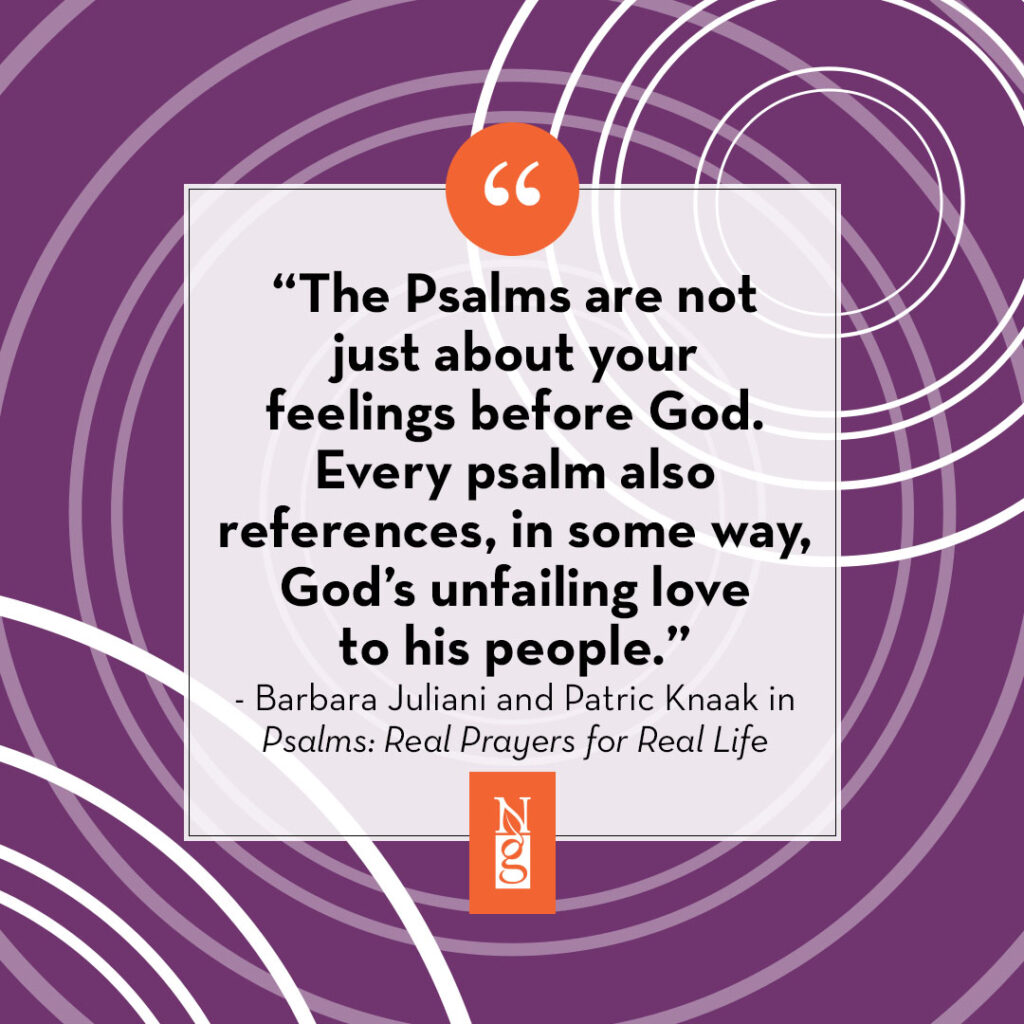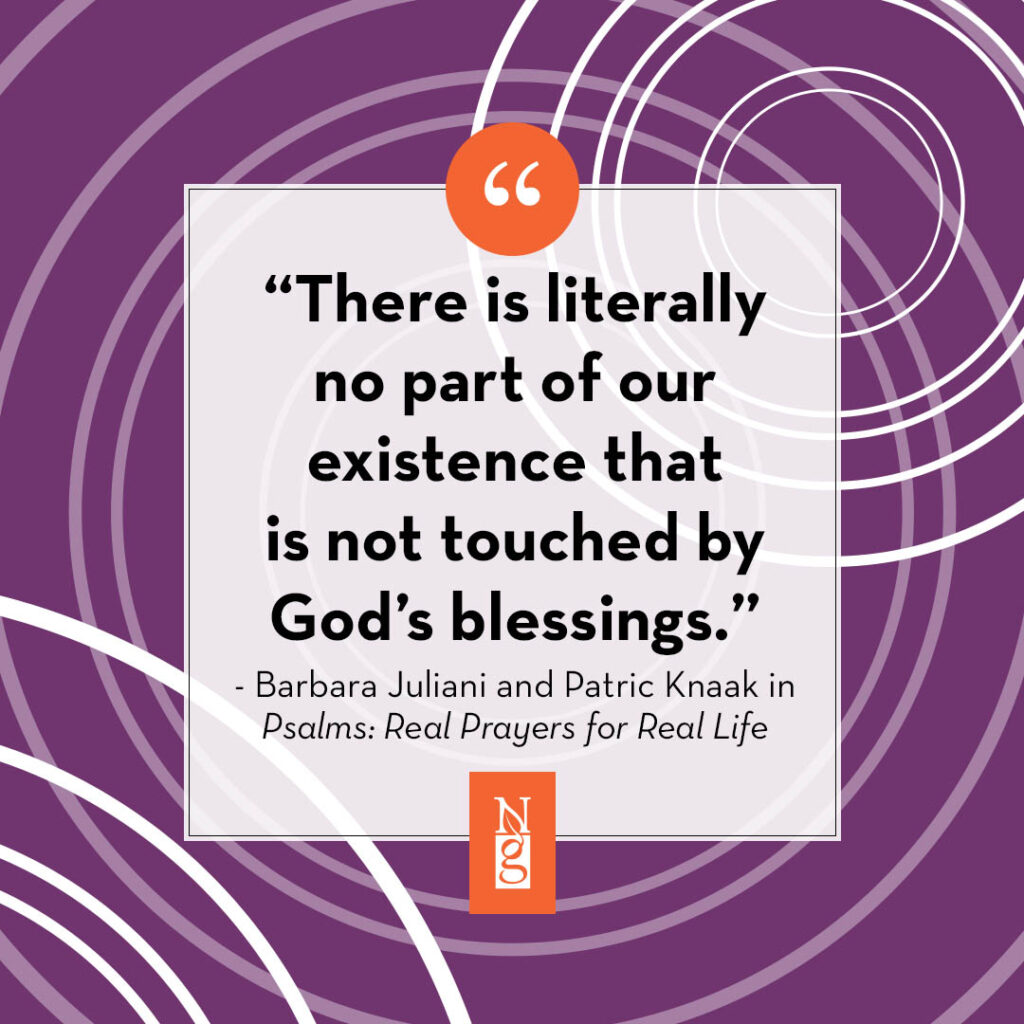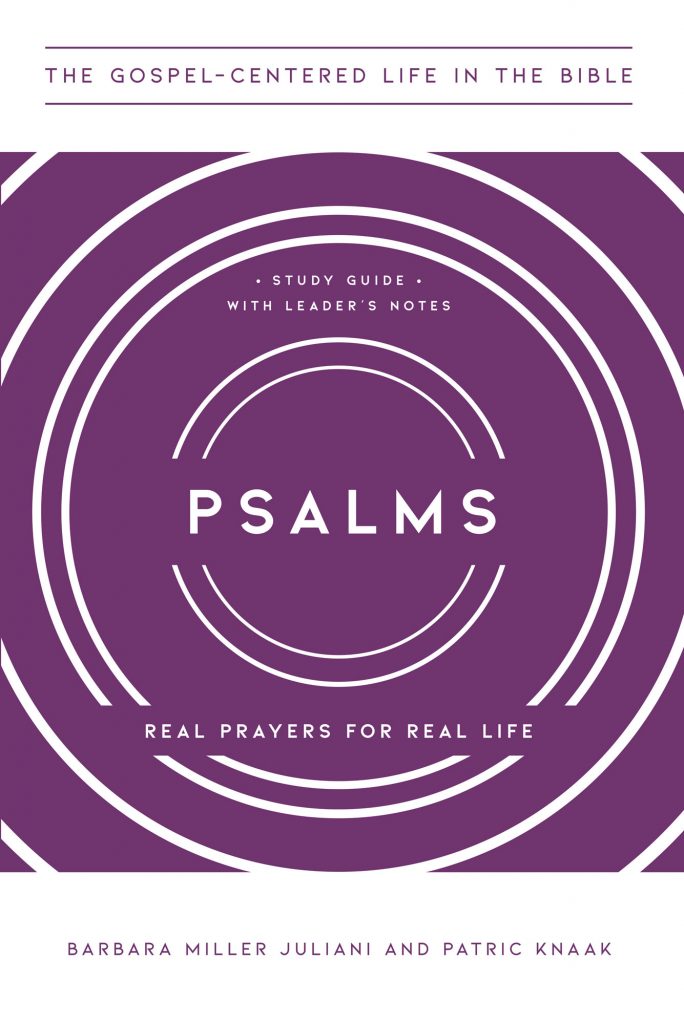How long? Why is this happening? Where are you, God? For centuries, God’s people have learned to go to God with their real questions, struggles, and everyday needs by reading and studying the Psalms. In Psalms: Real Prayers for Real Life, authors Barbara Miller Juliani and Patric Knaak guide participants through a study of how the Psalms offer words to pray about the real struggles in life.
In the following interview, they share more about their Bible study that is a part of the Gospel-Centered Life in the Bible series, published in partnership with Serge.
Q: The Gospel-Centered Life in the Bible series examines how the gospel story is revealed throughout both the Old and New Testaments. How is the gospel story unveiled in the Psalms?
Knaak: The Psalms have a unique part to play in the unfolding story of the gospel. Because they are considered wisdom literature and are entirely composed of poetry, instead of prose, they provide unique insights into what it means to live is as God’s children, under his gracious rule. Unlike other books of the Bible that help us understand the plotline of God redemptive plan in the coming, living, dying, and rising of Christ, or which contain didactic teaching, the Psalms actually model what lives lived under God’s rule look like. The Psalms touch on issues of justice and oppression, suffering, tragedy, faith, and trust and show how we as God’s children can bring our whole hearts before God in worship and prayer. They offer us the chance to hear from God himself how to structure our prayers and worship even during times of suffering and distress by providing examples of these sorts of prayers, songs, and liturgies. Their poetry helps unlock our theological imaginations to see more than just the bare facts of the gospel so we can experience its beauty and richness.
Juliani: Also, the Psalms were Jesus’s prayer book, and as we pray them, we follow in his steps in learning to trust God with all of our emotions, doubts, struggles, and joys. By faith we can pray the Psalms and believe the promises are true for all who are in Christ.
Q: Are all 150 of the Psalms prayers? How did you choose just ten psalms to study in the book?
Not all of the Psalms are prayers, though all of them can be used to shape and deepen our own prayers. There are several types of psalms, ranging from songs that were sung as the Israelites traveled up to Jerusalem each year for worship festivals, to personal prayers for deliverance and protection. There are also corporate liturgies that were spoken or sung at the installation of a new king. Regardless of the setting, each psalm models for us patterns we can use to shape our own prayers and the type of rich, heartfelt language that God wants us to use in our conversations with him. Sometimes we think that God expects us to not struggle in our faith. The Psalms remind us vividly that everyone struggles and suffers sometimes, and when that’s where we find ourselves, God wants us to come to him and completely express ourselves to him.
Choosing just ten psalms was really hard. We like to joke that whatever psalm we’ve most recently read ends up being our favorite—at least until we read the next one! So instead of trying pick psalms that were well known or personally meaningful to us, we chose a wide variety of psalms that touched on many different subjects that would help our readers deepen their prayer lives. Learning how God wants us to pray honestly and openly about issues like forgiveness and faith, suffering, fear, and discontentment as well as how to give him praise for his blessing to us and the way that rules over us and protects us was really the driving motivation for which psalms we chose to include. We also want our readers to not simply work their way through the study and then move on, but rather to learn through the study how any psalm—no matter what its topic is—can be used to deepen their conversations with God.
Juliani: Picking just ten was so hard, and we left out many of our favorites (an ever-expanding list!). But we did want to give readers some handholds for how to tell God about their deepest feelings, thoughts, and needs, but then to move from the telling on to hearing and trusting. There is no psalm (no matter how dark), that doesn’t acknowledge God’s love and control for our good over all of life.

Q: Do the elements that you pray for each psalm vary? What are the three elements you should pray with Psalm 1, for example?
Knaak: They do vary! That’s part of what makes the Psalms endlessly fascinating to me—that they cover so many topics, in so many different ways. Psalm 1 is a great example. Along with Psalm 2, it’s really intended to form an introduction to the entire Book of Psalms. Psalm 1 paints an evocative picture what a blessed life of being in God’s presence and following his Word looks like by contrasting the images of a tree planted alongside of a river with the leftover husks of wheat after the kernels have been removed. One is a picture of abundance and fruitfulness, whereas the other speaks to a life uselessness and rootlessness.
But it would be easy to read Psalm 1 and assume that the blessed life it describes is something we need to go out and earn through our actions and lifestyle. In fact, most of us sort of default to a “God will only bless me if I’m good enough to please him” mentality. Psalm 1, however, is actually describing the blessings that we have in and through Christ. It’s Christ that allows us to live a blessed life, based on what he’s already accomplished for us through his work on the cross. In light of that, we carry this theme over into the prayer exercise for the psalm by helping people see how they can more deeply appreciate and experience these blessings through the elements of confession, making our requests known, and offering thanks to God.
Juliani: Instead of looking for elements to pray, I think the best approach is to read the psalm and identify one verse (or more) that maps on to your experience right now—then make that your prayer. For example, when you read, “God is good and what he does is good,” (Psalm 119:68), what springs to mind? Would you thank God for his goodness to you? That could be one response. But you also might frame that as a question back to God: “If you say you are good and you do good, then why is ____________ happening right now?” Or you might pray it as a promise: “You say you are good, please help me to see your goodness right now in this time.” Let your life combine with the truths of the psalm you are reading to form an honest and heartfelt prayer.
Q: What are some of the different focuses of prayer that you study throughout the book?
Knaak: We cover most of themes you’d expect: offering prayers of thanksgiving, praise and worship to God for who he is and what he has done; prayers for protection and deliverance when we are afraid, discontent, and facing opposition, and prayers that acknowledge God’s power and rule, even when we are having a hard time seeing them.
But I think what really sets Psalms: Real Prayers for Real Life apart isn’t the themes we chose, but how we let the Psalms themselves show us how to pray about each of these things. I’ll be the first to admit that I’m a terrible pray-er. I either get bogged down in running through my list of requests for myself and others or lose focus pretty quickly. The Psalms give us well-crafted paths to walk on as we pray through all of these subjects. They show us how to both confess that we trust God even as we confess that we often don’t follow him the way that we should. What is particularly powerful about this approach is that we have tried to let God’s own words via the Psalms lead us and shape our prayers. We’re created to have a living, breathing, growing relationship with God. The Psalms help us learn how to talk with God and listen to him in real-world ways, that are still creative and focused without being repetitive or rote.
Q: What is an anti-psalm? How does it work as a tool to understand what God is teaching through the original psalm?
Juliani: Sometimes it’s helpful to first write out the contrast between what is in your heart and life right now with the psalm you are reading. This honest appraisal of what you are really thinking and feeling can open the door to real prayer for your real life. For example, you could say about Psalm 23, “I don’t feel like the Lord is my shepherd right now. There are no green pastures and no quiet waters in my life. Help me to turn to you and see who you really are.”
Q: Why is it important to value not only our prayers of praises but our laments as well?
Knaak: This is one of the chief things that the Book of Psalms as a whole teaches us through all of the psalms that touch on suffering, tragedy and pain. When we encounter these things, our hearts tend to either move toward God or away from him. Lament is one of the ways that God teaches us to bring our heartache and sorrow before him in honest, healing ways. Psalm 22 does this in a remarkable way because Jesus himself quotes from it as he is dying on the cross. In doing so, he reminds us that neither his suffering at that excruciating moment, nor our suffering in the losses we face, are the end of the story. God is at work in deep and sometimes hidden ways. But he is at work.
Lament helps us both acknowledge the pain and suffering we are experiencing in honest, helpful ways but to also lift our eyes to heaven, where our Father sees our pain and is working to make all things new. Christians don’t always do well keeping both of those things connected—acknowledging our pain and refocusing our hearts on God. I know in my own life I’m prone to only see my pain and suffering and forget, or even worse disbelieve, that God still loves me and is providing for me. Or at times, we go the other direction and instead of acknowledging the deep pain and hurt of others, we gloss over them, sometimes putting a small bandage on a large wound. Lament helps shape our prayers so that we can hold to both of these realities at the same time and bring them both into our conversation with God.
Juliani: If we don’t know that the Lord values our laments and saves our tears, then we will hesitate to say anything real to him about our lives. Living in this world gives us many things to lament, and Jesus, who lived out his lament on the cross crying out Psalm 22, wants to hear all about it. Then he wants to reassure us that those emotions are welcomed in his kingdom, and he shares them with us and empathizes with us. True lament and true faith are not opposites—they are the way of the cross.
Q: What are the five practical principles Psalm 73 gives us to shape our prayer lives when we are struggling with discontentment and disappointment?
Knaak: Psalm 73 was written by a temple priest named Asaph. He’s become discontent because of the way those who ignore God and his Word seem to have better lives, at least at a surface level, than those who remain faithful. So, in Psalm 73 Asaph chronicles his prayer journey as he works through his dissatisfaction. As he does, through his honesty and imagery, Asaph gives us five practical principles that should shape our own prayer lives when we too are struggling with discontentment and disappointment:
- Acknowledge the reality of God’s goodness even when everything seems contrary. This reminds us where to turn and that we can ultimately trust God. (v. 1)
- Follow Asaph’s downward path by bringing our struggles directly to God. (vv. 4-16)
- Spend time worshiping God to recalibrate our hearts and our minds. (v. 17)
- Change direction. Follow Asaph’s upward path by reframing our struggles in light of God’s promises. (vv. 18-26)
- Tell others of God’s deeds, ensuring we tell them the whole story—including the hard parts. (v. 27).
Q: With all that is going on in our world right now, what are some psalms that we can pray to help with our fears and worries or even for the injustices going on around us?
Knaak: While nearly every psalm could help us focus our prayers for these issues there are a few that come to mind that would be particularly helpful:
- Psalm 2 which reminds us that God is the King over all earthly powers and his reign cannot be stopped.
- Psalm 91 which shows us how to come to God when we are afraid and paints amazing pictures of his goodness and protection.
- Psalm 73 speaks to when we are feeling discontent and our relationship with God doesn’t really seem to matter compared to the blessings that the world offers.
- Psalm 13 when it seems like God has stopped listening to us or isn’t answering our prayers.
- Psalm 10 and 55 when our hearts are crying out for justice and yet injustice is very real and very present.
Juliani: That’s agreat list from Patric. Here are a few to add, and there could be many more.
- Psalm 46 because God is our ever-present help and refuge in times of trouble.
- Psalm 121 is a song for travelers—we are on pilgrimage and this world is not our home but while we are here God watches and keeps us.
- Psalm 131 is a psalm of trust where all the largest and most difficult things are left in God’s hands and are not meditated on (they are too wonderful for me).

Q: What are the elements of each lesson, and how is the study designed to be used?
Knaak: This small group guide with leader’s notes includes ten in-depth lessons for one-to-one discipleship, small group, or large group settings. With rich discussion questions, exercises, and articles to encourage thoughtful responses to the text, this study guide helps readers see the gospel more clearly in each psalm. Studying with others allows group members to not only benefit from what God is teaching them, but what others are learning in the process.
Q: Your Psalms study is a part of the Gospel-Centered Life in the Bible series. What other studies are available in the series?
Juliani: Psalms: Real Prayers for Real Life is part of The Gospel-Centered Life in the Bible series published by New Growth Press in partnership with Serge. Each book in the series examines how the gospel story is revealed throughout both the Old and New Testaments.
The other studies in the series include:
- Ephesians: The Love We Long For by Scotty Smith
- Revelation: Hope in the Darkness by Scotty Smith
- Titus: Life-Changing Truth in a World of Lies by Jeff Dodge
- Ruth: Redemption for the Broken by Jared Wilson
- Jonah: Grace for Sinners and Saints by Iain Duguid
- 1 John: Relying on the Love of God by Scotty Smith
- Ecclesiastes: Life in the Light of Eternity by David Gibson
There are three more studies on Ezra and Nehemiah, Isaiah, and 1 Peter that will be available in August 2022.
The Gospel-Centered Life for Students series includes studies of Exodus and Mark.
Psalms: Real Prayers for Real Life
How long? Why is this happening? Where are you, God? For centuries, God’s people have learned to go to God with their real questions, struggles, and everyday needs by reading and studying the Psalms. In this practical, gospel-rich small group study, authors Barbara Juliani and Patric Knaak guide participants in learning how the Psalms give us words to pray about the real struggles in our lives






